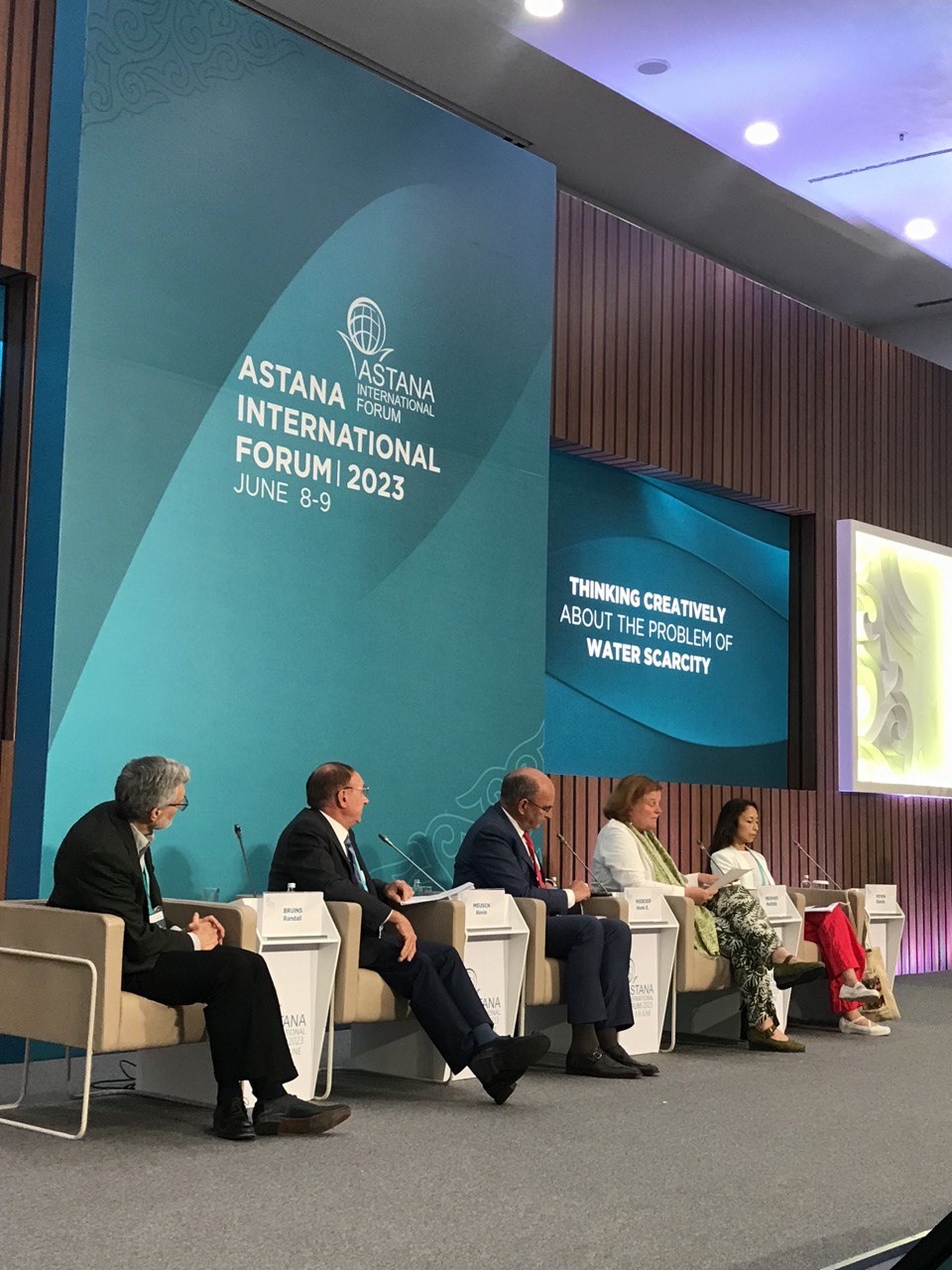ASTANA – Solutions to water scarcity, a rising problem around the globe, was the focus of a panel session, Thinking Creatively About the Problem of Water Scarcity, at the Astana International Forum (AIF) on June 9, which brought together experts and thought leaders from various sectors.

Randall Bruins, Kevin Meusch, Henk Nieboer, Mathilde Mesnard and Estelle Peyen. Photo credit: The Astana Times.
Stephen Cole, a former journalist at the BBC, who moderated the discussion, said 70% of the planet is covered by water, but nearly 97% of that water is salty, and another 2% is frozen in ice caps glaciers.
“That leaves only 1% of the planet’s drinking water available for billions of people around the world,” he said.
“Water scarcity is also an issue in Kazakhstan, as 90% of Kazakhstan’s water arrives in one big spurt with spring runoff,” added Cole.
He suggested that the problem is a water surplus in some places and a deficit in others. He added that 3.5 billion people around the globe live under conditions of water stress at least one month of the year.
Cole reminded the audience that the recent United Nations Water Conference urged the countries to take bold and coordinated actions internationally.
Henk Nieboer, director of the Netherlands Water Partnership and head of the Netherlands-Kazakhstan Business Association, spoke about the over-exploitation of finite resources. Other issues at the core of the problem are excessive pollution, nutrient loading by chemicals, and institutional issues such as lack of coordination between sectors or countries.
“Significant savings for water use are possible to improve management practices and technical solutions, in addition to improved spatial planning. It should be done by taking river basins as the defining landscapes,” Nieboer said.
According to Mathilde Mesnard, deputy director and Co-ordinator for Climate and Green Finance for the Environment Directorate at the Organization for Economic Co-operation and Development, global climate change and economic growth will further increase fierce competition for water in the region.
She stressed the importance of cooperation and dialogue in addressing water security. She commended the efforts of the Central Asian countries in transboundary cooperation in the past 30 years.
Randall Bruins, former environmental scientist and Strategic Advisor at Enactus Kazakhstan, suggested several innovative solutions, including the use of agricultural waste in water filter production.
“We must transform more of our student projects into sustained enterprises,” he added.
Nieboer also emphasized the importance of international cooperation, as most of the water comes from neighboring countries.
“It is encouraging that Kazakhstan already has some quite robust boundary water maintenance treaties in place although not for every river basin. The Kazakh government has a strategy to create a green economy,” said Nieboer.
He noted that water availability and demand could be matched by reducing water usage, creating polluted water conservation ecosystems, and green agriculture.
According to him, agriculture should be reoriented towards less water-intensive crops, reduction of agrochemical loads, integrated pest and disease control, and irrigation technologies.
Cole asked Mensard about creative examples of addressing water scarcity in Central Asian countries.
She outlined four key areas for development in this area, including inter-regional coordination of water source management, a joint investment plan for water and energy infrastructure between Central Asian countries, enhanced interaction and synergies between water sector institutions and the energy sector, application of insurance, and blended finance mechanisms.
As an example of innovation in Central Asia, Mensard mentioned the strawberry producer that invested in opening greenhouses, reducing water consumption by 95%, as well as reducing land and water pollution without using pesticides.
To persuade farmers to be more creative in the use of water, Estelle Peyen, founder and president of Cross Country Skiing Sand (XCSS), suggested agroforestry courses for farmers, teaching them to reuse their organic waste by producing bio compost.
Cole pointed out that according to the World Resource Institute, only a quarter of the 790 water commitments are taken seriously.
“I think most of our governments don’t lead by example, but they lead by being pressured by the population,” said Nieboer.
The experts also emphasized the importance of education in water management.
“People need to be aware of the intrinsic value of water. We need the power of storytelling, communication, and inspiration. This is what we need to work on,” Nieboer concluded.

